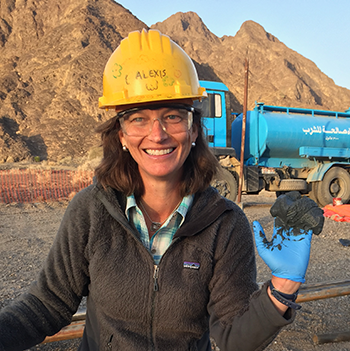126th Distinguished Research Lecture: Alexis Templeton

Hydrogen: Integrating the Searches for New Energy Sources and Novel Life Activity Within the Earth
Thursday, November 20 @ 4–5 p.m. (Q&A and reception to follow)
Chancellor's Hall and Auditorium, Center for Academic Success and Engagement (CASE)
Our planet has produced energy sources such as hydrogen gas since its formation more than 4.5 billion years ago. Some of the earliest life forms are hypothesized to have used hydrogen to power their metabolisms, and today an incredible diversity of microorganisms flourish within Earth’s subsurface wherever hydrogen persists.
To understand the controls on the distribution and function of Earth’s subsurface biosphere, Professor Alexis Templeton (Geological Sciences, Center for Astrobiology) has been investigating how rocks undergoing active hydration generate hydrogen fluxes and sustain life activity. That same foundational knowledge is now proving integral to the global search for hydrogen as a clean energy source essential to meeting decarbonization and energy security goals.
By understanding when and where subsurface rocks can be coaxed to produce hydrogen—and the extent to which resident microbial life consumes or preserves that hydrogen—we can begin to access or engineer abundant sources of geological hydrogen. Such information is urgently needed to de-risk global efforts to explore and produce hydrogen as a low-carbon primary energy source.
Alexis Templeton is a professor in the Department of Geological Sciences and the CU Center for Astrobiology. Templeton received her BA and MS in Earth Sciences from Dartmouth College, followed by employment by the Department of Energy at the Lawrence Berkeley National Laboratory. She then completed her PhD at Stanford University, examining how heavy metals can be transformed from toxic to non-toxic states at the surfaces of minerals and microbial organisms.
Professor Templeton completed her training as an NSF postdoctoral scholar at the Scripps Institution of Oceanography, examining how microbial life thrives inside submarine volcanoes, before starting her professorship at CU Boulder in 2005. She is an active member of the Geobiology program, and she teaches several courses in geochemistry, in the classroom and field-based settings in the mountains of Colorado.
Templeton’s research investigates how microbial life functions in the Earth’s subsurface environments, harnessing chemical energy produced as water flows and reacts through rocks. Her work has moved from volcanoes in the Pacific to cold springs in the High Arctic to the mountains and deserts of the Arabian Peninsula. Through funding from NASA, the Department of Energy, and the Grantham, Packard and Simons Foundations, she has led several large multi-disciplinary projects to investigate the subsurface biosphere on Earth and the potential for similar life forms to exist elsewhere in our solar system.
Currently, Templeton is developing projects around the world with academic, government and industry partners to harness hydrogen produced naturally by the Earth as a future clean energy source.
Strategy & Development
- Funding
- Faculty Development
- Proposal Development
- Other Resources
- National Laboratory Partnerships at CU Boulder
- Sustainability Research Initiative
- Research Computing
- Contact Us
Our 12 research institutes conduct more than half of
the sponsored research at CU Boulder.
More than 75 research centers span the campus,
covering a broad range of topics.

